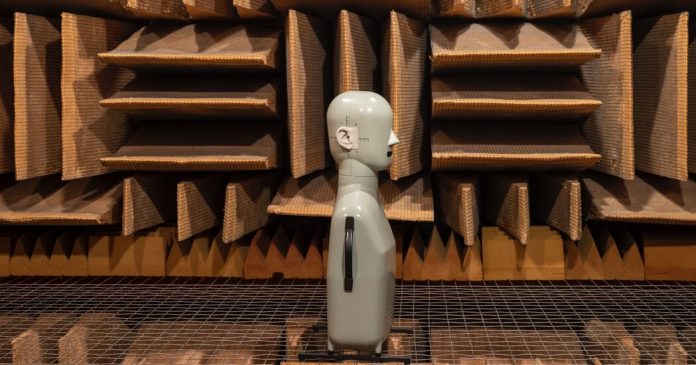The day of my document try, Orfield crossed the room’s threshold, and his voice instantly sounded distant, because the wedges absorbed his sound waves. After I adopted him inside, the sound grew to become intimate. I had been warned that anybody talking to me inside an anechoic chamber would sound as in the event that they had been standing simply subsequent to me, murmuring into my ear. It’s an aural phantasm: In a standard room, the one means for us to listen to speech instantly from somebody’s mouth, with no reverberation, is for her or him to speak proper into our ear.
The chamber was outfitted with an workplace chair for my three-hour keep. Orfield Laboratories’ gray-ponytailed supervisor, Michael Function, outlined the sophisticated phrases I would wish to stick to to be able to set a brand new document: I would wish to remain within the room for 3 hours. It was my option to have the lights on or off. Confronted with the prospect of watching a 12-by-10-foot room for 3 hours with no adornments besides a chair and lots of of hanging fiberglass pyramids, I opted for whole darkness. “Typically individuals like to put down or sit on the ground, so I depart a pleasant padded blanket in right here,” Function stated, handing me a blue blanket — which I unfold throughout the ground — earlier than shutting the door (unlocked, he assured me), leaving me in lightless silence.
To start out, I laid on my abdomen — a place I felt was relaxed sufficient for my physique to acclimatize to the dearth of stimulation, however uncomfortable sufficient to stop my instantly falling asleep, which might have been a mortifying flip of occasions to elucidate to my employer, who anticipated me to supply an in depth written description of my expertise. I resolved to lie on my again and pray the phobia of being fired could be sufficient to maintain me awake at midnight for 3 hours, regardless of the medical analysis of narcolepsy that makes it nearly inconceivable for me to remain awake in even reasonably cozy semidark circumstances. (I had not identified that there could be a blanket within the chamber — my kryptonite.)
As soon as supine, I skilled the distinctive and briefly scary sensation that my ears had been touring up very quick in an elevator whereas the remainder of my physique fell gently towards Earth. I had the distinct feeling of my ear canals filling with an in-rushing silence that was in some way thicker than the quiet I had first seen within the chamber. Inside seconds, this ceased, and every little thing sounded — or quite, continued to haven’t any sound — precisely the identical as earlier than. I groped round for the notepad and pen I introduced and recorded the observations that began to roll in: “grey ponytail,” “thick silence.”
However was I recording them? It was inconceivable to inform within the unrelenting darkish. What if the free lodge pen didn’t work? What if I took reams of attention-grabbing notes over the course of three hours, solely to find, when the lights flickered on, that the pen had been dry and recorded nothing? Why do I, an expert journalist, always discover myself counting on free lodge pens throughout essential moments of my assignments? May I press onerous sufficient with an inkless pen to have the ability to reveal the indentations of my handwriting after the actual fact by rubbing over them with crayon? Wasn’t it simply my luck that the one pen I had introduced was very seemingly incapable of writing, and that I had idiotically positioned myself underneath circumstances the place I might be unable to definitively verify this for 3 hours?
In additional summary methods, I had ready quite completely for this task, having contacted Dr. Barbara Shinn-Cunningham, the director of the Neuroscience Institute at Carnegie Mellon College, and requested her if turning into conscious of my very own physique sounds would make me go insane. “No,” she stated. “Until you’ve got a predilection for being insane to start with — which, you understand, might be.” That opened up a brand new avenue of inquiry. I known as Dr. Oliver Mason, a researcher of psychotic issues on the College of Surrey, who has led research monitoring topics’ experiences in anechoic chambers. “Should you take away all sensory enter,” Mason stated, “our brains, that are at all times attempting to differentiate sign from noise anyway, merely see sign the place there objectively isn’t one.” Even when they haven’t any psychological sickness, some persons are extra vulnerable to conjuring phantom indicators than others and can accomplish that rather more rapidly, based on Mason. Most individuals tolerate brief durations of time in lightless anechoic chambers — about 20 minutes, for his experiments — “advantageous.” People vulnerable to “uncommon perceptual experiences” — who suppose issues are occurring to them after they’re not — usually report experiencing hallucinations inside that small window.


